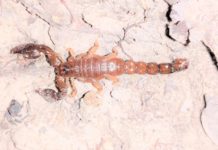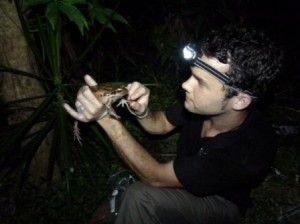
Dominica is often called nature isle and is an emerald jewel in the Caribbean Sea. It has 60% of its forests remaining and the most intact reptile and amphibian assemblage in the Caribbean. Dominica was once the stronghold of the giant amongst frogs, the mountain chicken (Leptodactylus fallax). The mountain chicken has the dubious privilege of being the national dish and is of great cultural importance to the people of Dominica. In 2002 the mountain chicken populations on Dominica crashed, the culprit, chytridiomycosis a fungal disease which the mountain chickens seem particularly susceptible to. In just 18 months following the emergence of chytridiomycosis on Dominica the mountain chicken population declined by an alarming 80%.
A some of the few surviving mountain chickens in Dominica were captured from the wild and transported to the UK where they were housed in a biosecure unit at the Zoological Society of London (ZSL), with the idea of sending the frogs back to Dominica at a later date. Back in Dominica a captive breeding facility was developed and built in the botanical gardens in the islands vibrant capital, Roseau. In 2005 a molecular laboratory was built in the gardens, with the capacity to analyse swabs for the presence of chytridiomycosis.
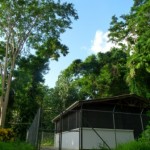
Due to their voracious appetites the most important husbandry aspect to address was that of providing adequate food. In captivity, these gargantuan frogs can gobble down 100 crickets a week! Jimmy Dale travelled out to Dominica and in collaboration with Forestry Department set up invertebrate breeding colonies using native species. Capacity building was, and still is, a vital component of the project. In Dominica Forestry staff were trained on how to maintain invertebrate live food colonies. A biotechnologist received laboratory training at the Institute of Zoology and two Forestry staff received intensive training on the captive husbandry of mountain chickens at London Zoo and the Durrell Wildlife Conservation Trust.
With all the preparations in place, all that was needed were some mountain chickens for the facility!
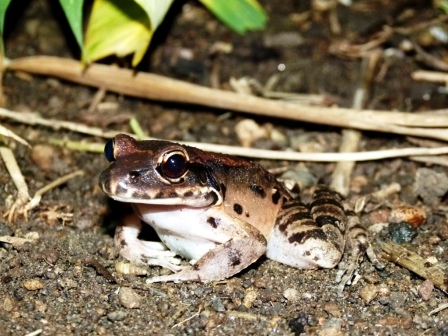
In February 2010 Jenny Spencer travelled to Dominica on behalf of ZSL to continue with the herculean task of expanding live food colonies and preparing the facilities for frogs that were going to be sourced from the ex-situ component of the project. One night Jenny actually heard a frog calling from her apartment. After an intensive search, five frogs were captured and brought into the breeding facility in Roseau. Earlier on this year Jenny and Professor Andrew Cunningham found a juvenile mountain chicken, the first evidence in recent years that the frogs are breeding in the wild, a fantastic boost for the project here in Dominica.
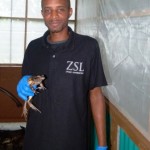
In September I flew out to Dominica to replace Jenny. Since I have been here I have been kept busy, crawling around in the forest capturing gangly legged cave crickets and leathery slugs to replenish our live food colonies, searching cane fields for new live food species and working with the forestry department in the captive breeding facility. It has been great working with people who are so dedicated to conserving the mountain chicken. Last week was the high point of all high points; we visited one of the few areas that still have mountain chickens. I was taken aback by how suburban it was! The mountain chickens are actually surviving in small plantations in a relatively built up area. Amongst the banana plants and sugar cane we struck gold, we found three juvenile mountain chickens. It was actually one of the more surreal experiences of my life, swabbing these Critically Endangered frogs and taking morphometric measurements whilst listening to the sound of the TVs blaring out from different houses surrounding the plantation. The three frogs were captured and bought back to the facility in Roseau. It is early days but so far they appear to have acclimatised to life in the facility very well.
– Ben Tapely, Dominica volunteer




